Abstract
A flow cytometric technique has been established for accurately quantitating the cell surface density of MHC antigens and the percentage of cells expressing MHC antigens in 38 colorectal tumours. Thirty-four percent of tumours were partially or completely negative for HLA-ABC antigen expression. Although the quantity of HLA-ABC antigens varied widely, there was no correlation between the density of HLA-ABC antigens, or the percentage of cells expressing these antigens and clinicopathological stage. Fifty percent of the colorectal tumours expressed HLA-DR with varying antigen densities. All of the poorly differentiated tumours expressed HLA-DR but there was no correlation between expression of HLA-DR and clinicopathological stage. The aneuploid tumours expressed more HLA-ABC and HLA-DR antigens on a higher percentage of cells than the diploid tumours. Abnormal expression of the tumour associated antigens CEA, Y haptenic blood group and 791T p72 also correlated with expression of HLA-ABC and HLA-DR antigens on colorectal tumours. The majority of early derived in vitro dividing cells failed to express both HLA-ABC and HLA-DR antigens although they expressed high levels of tumour associated antigens. If there is a correlation between in vitro and in vivo growth perhaps tumours are maintained and seeded by MHC antigen negative cells.
Full text
PDF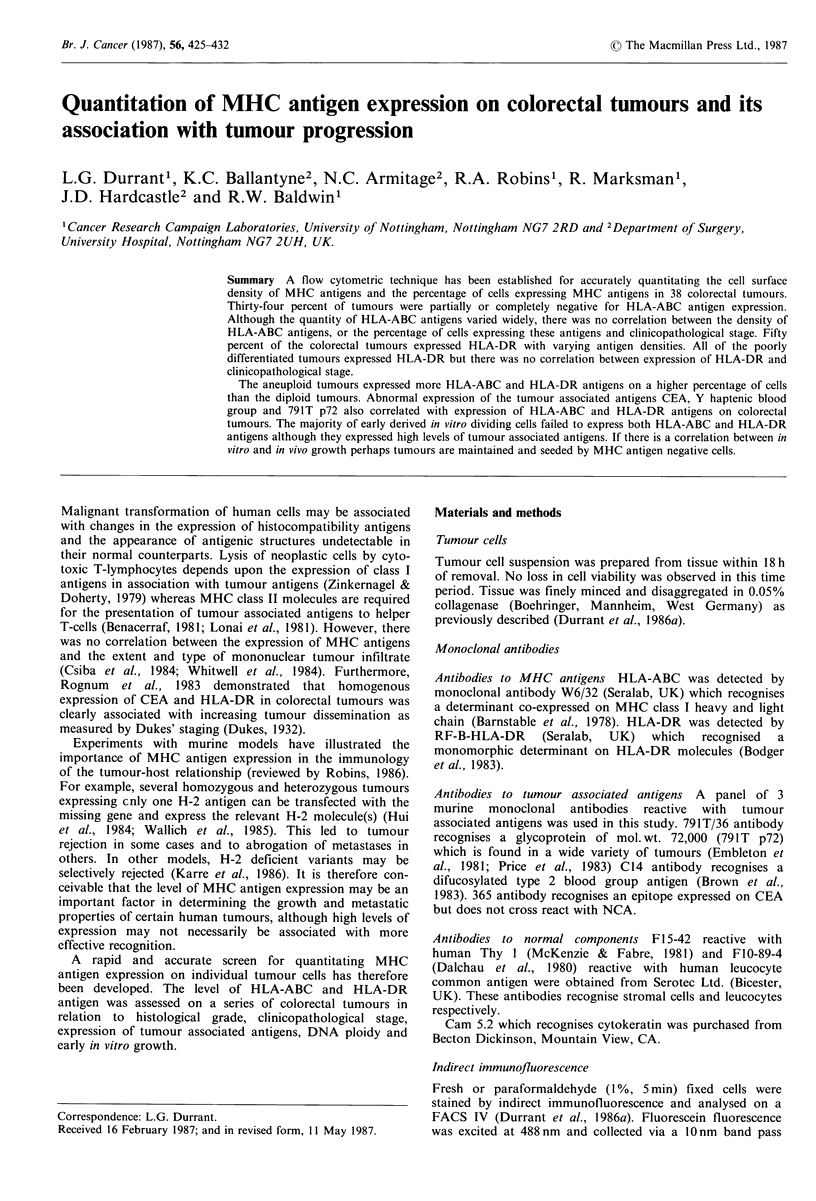
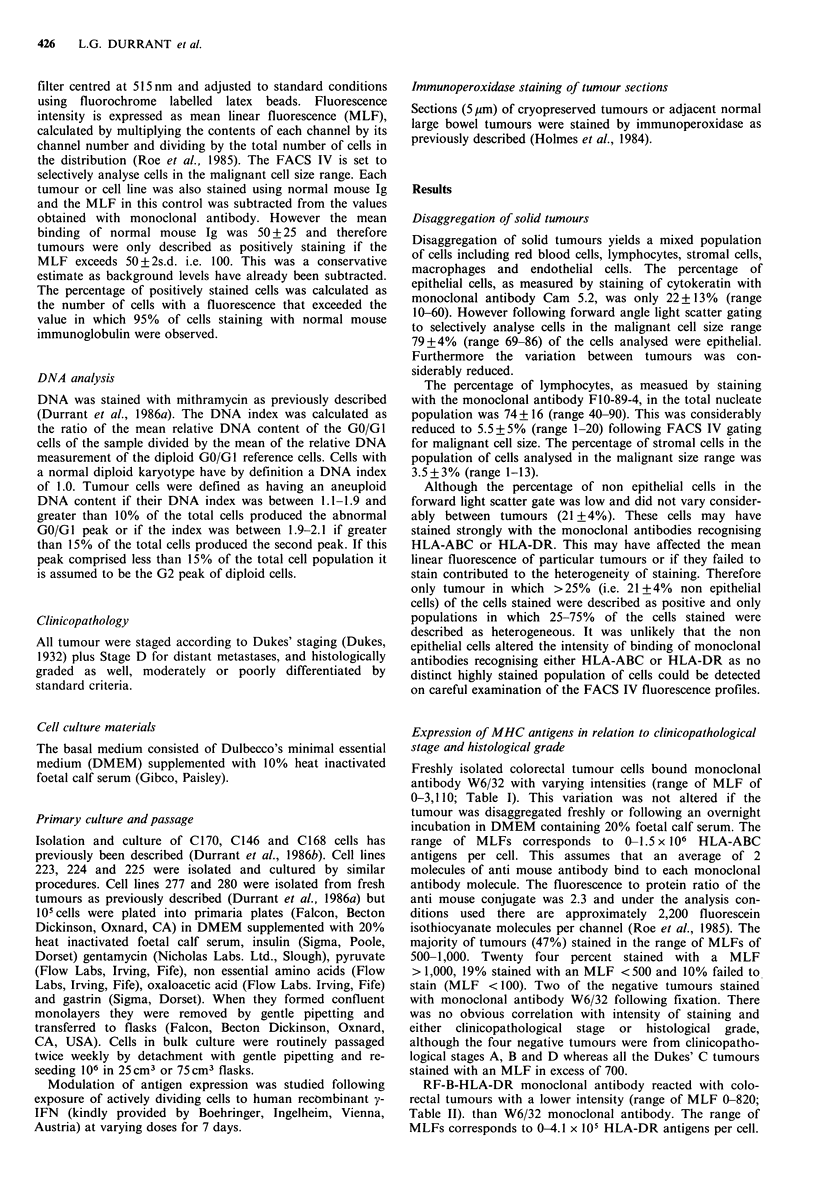
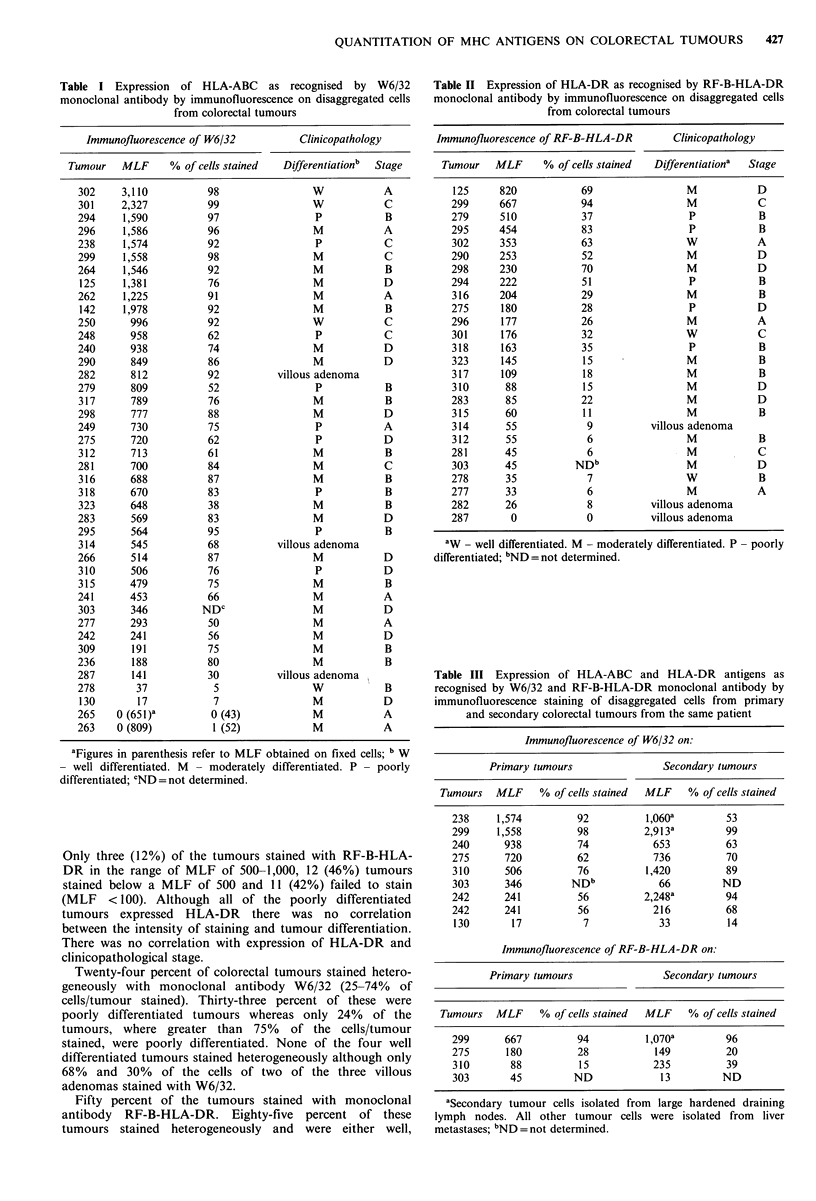
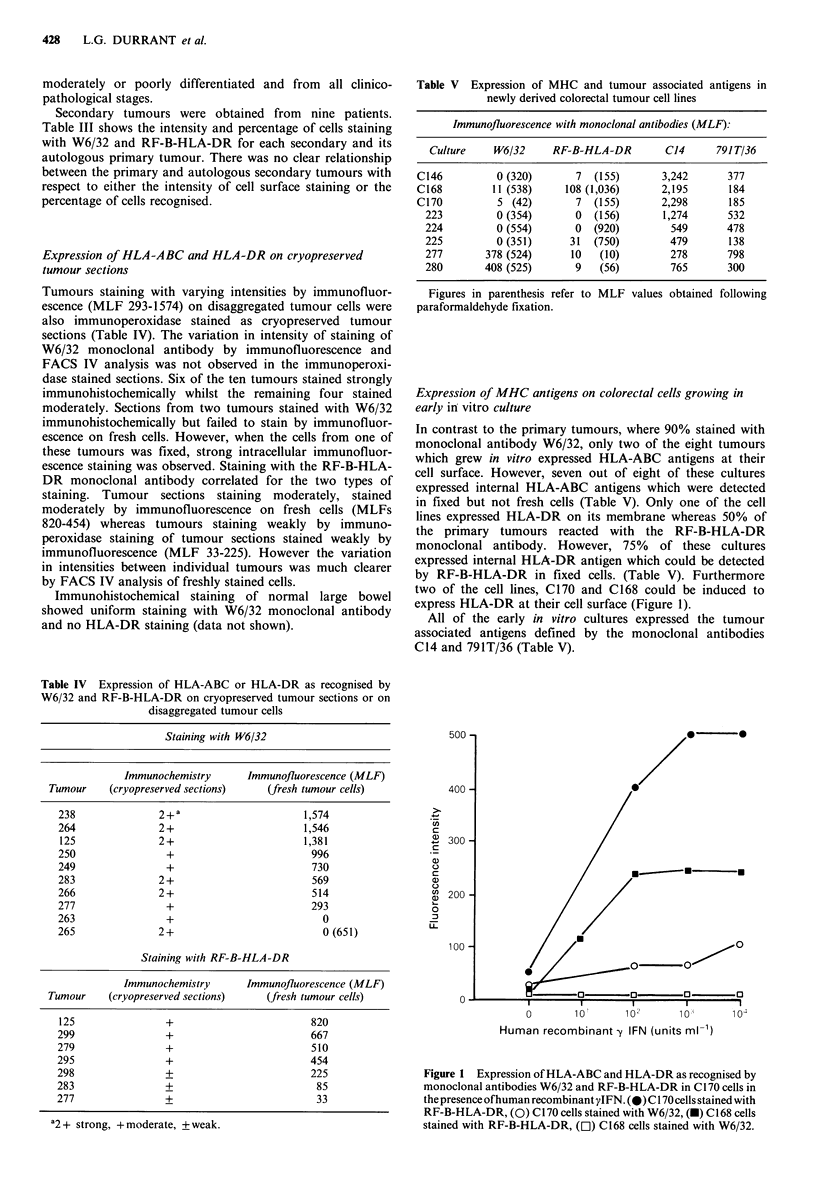
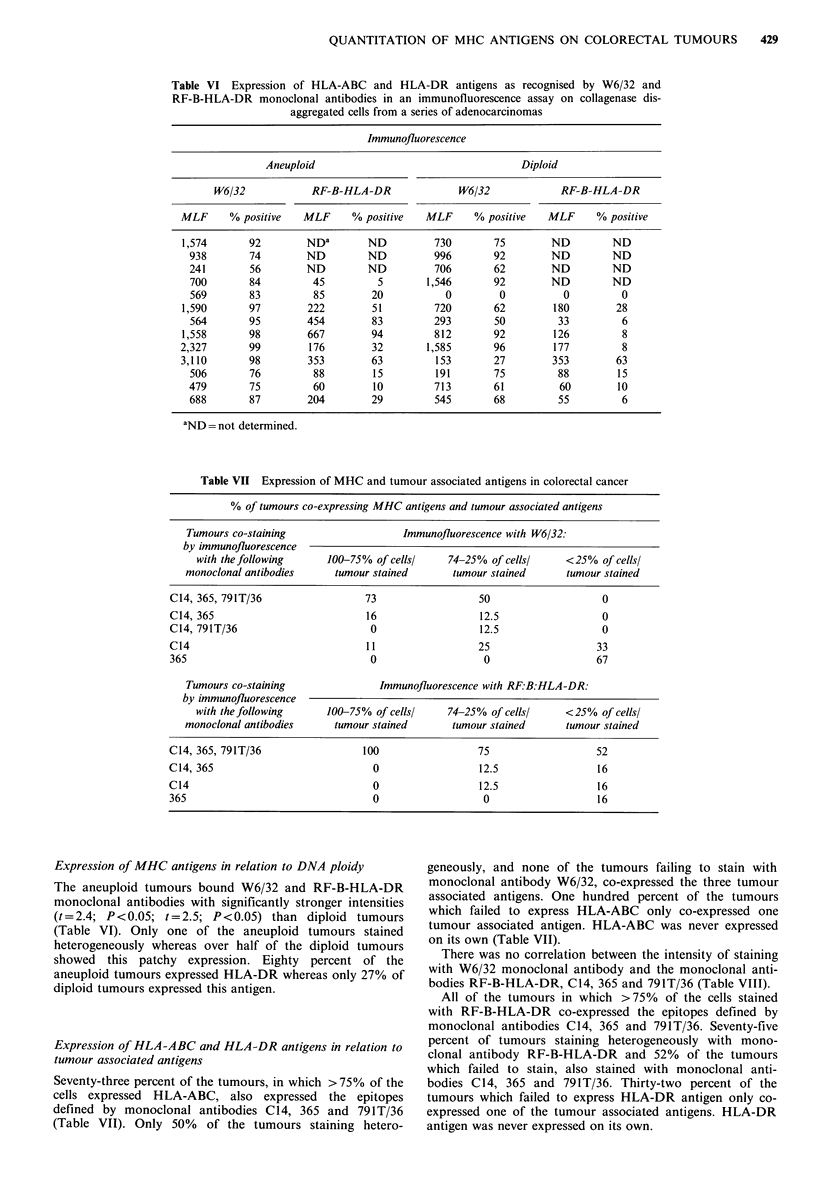
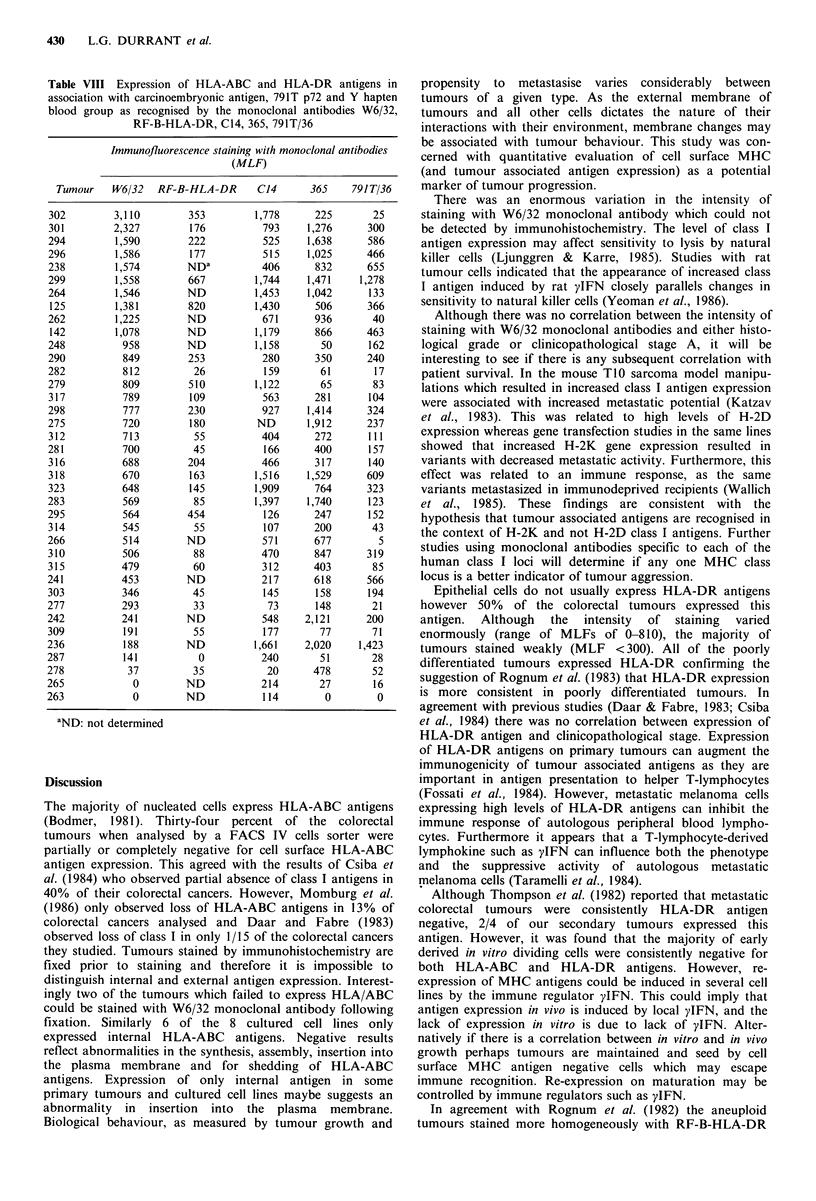
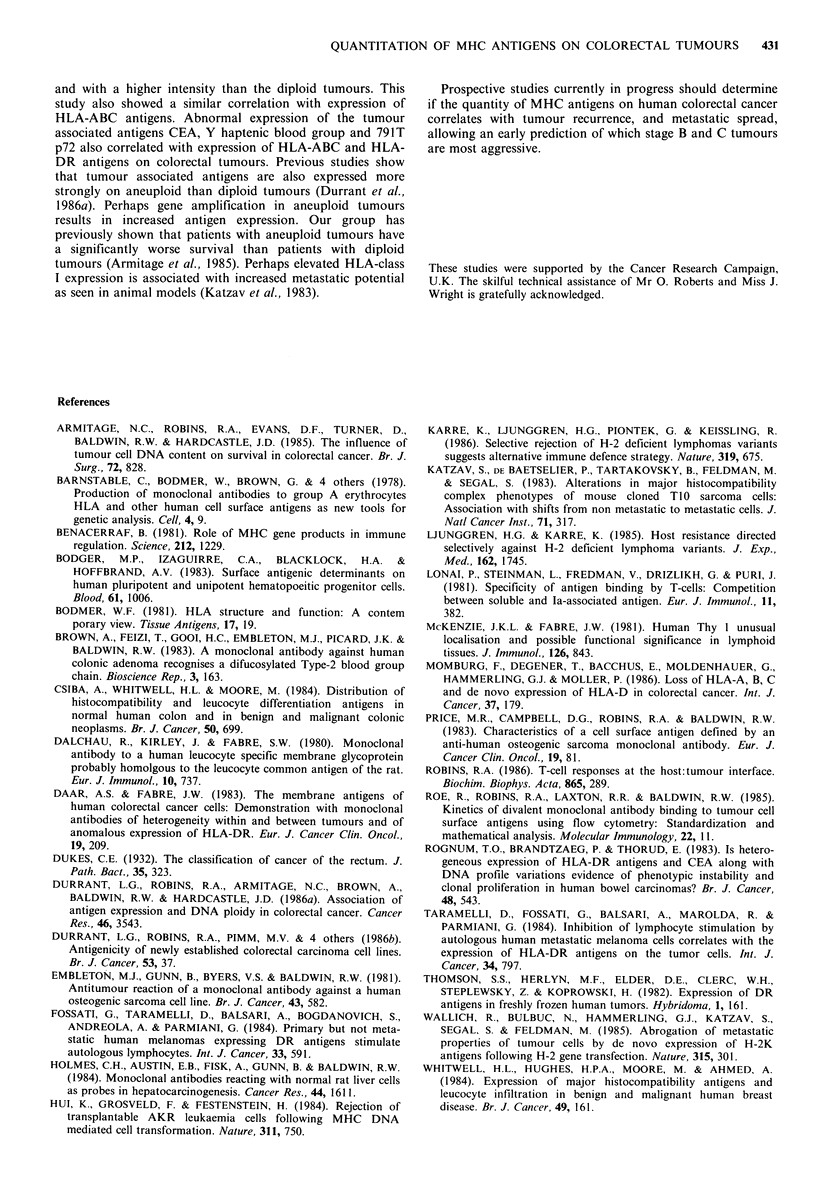
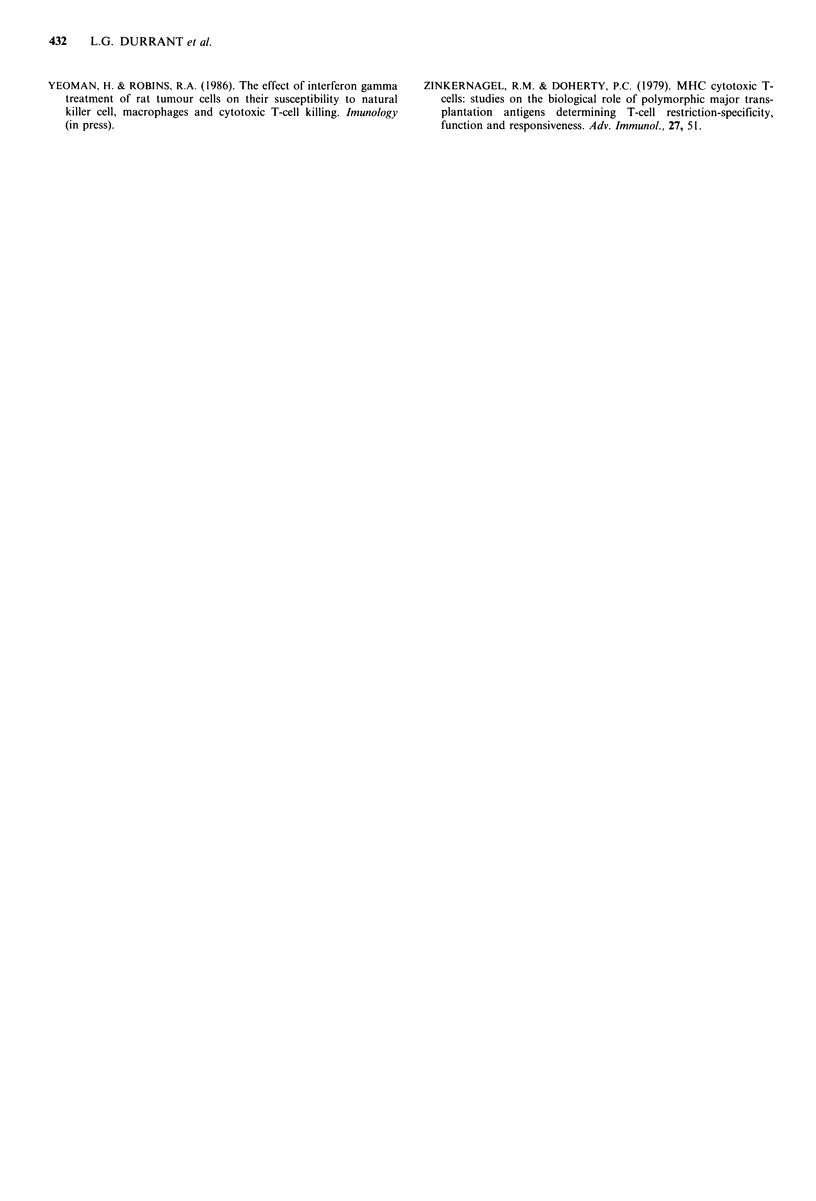
Selected References
These references are in PubMed. This may not be the complete list of references from this article.
- Armitage N. C., Robins R. A., Evans D. F., Turner D. R., Baldwin R. W., Hardcastle J. D. The influence of tumour cell DNA abnormalities on survival in colorectal cancer. Br J Surg. 1985 Oct;72(10):828–830. doi: 10.1002/bjs.1800721018. [DOI] [PubMed] [Google Scholar]
- Benacerraf B. Role of MHC gene products in immune regulation. Science. 1981 Jun 12;212(4500):1229–1238. doi: 10.1126/science.6165083. [DOI] [PubMed] [Google Scholar]
- Bodger M. P., Izaguirre C. A., Blacklock H. A., Hoffbrand A. V. Surface antigenic determinants on human pluripotent and unipotent hematopoietic progenitor cells. Blood. 1983 May;61(5):1006–1010. [PubMed] [Google Scholar]
- Brown A., Feizi T., Gooi H. C., Embleton M. J., Picard J. K., Baldwin R. W. A monoclonal antibody against human colonic adenoma recognizes difucosylated Type-2-blood-group chains. Biosci Rep. 1983 Feb;3(2):163–170. doi: 10.1007/BF01121947. [DOI] [PubMed] [Google Scholar]
- Csiba A., Whitwell H. L., Moore M. Distribution of histocompatibility and leucocyte differentiation antigens in normal human colon and in benign and malignant colonic neoplasms. Br J Cancer. 1984 Nov;50(5):699–709. doi: 10.1038/bjc.1984.239. [DOI] [PMC free article] [PubMed] [Google Scholar]
- Daar A. S., Fabre J. W. The membrane antigens of human colorectal cancer cells: demonstration with monoclonal antibodies of heterogeneity within and between tumours and of anomalous expression of HLA-DR. Eur J Cancer Clin Oncol. 1983 Feb;19(2):209–220. doi: 10.1016/0277-5379(83)90419-4. [DOI] [PubMed] [Google Scholar]
- Dalchau R., Kirkley J., Fabre J. W. Monoclonal antibody to a human leukocyte-specific membrane glycoprotein probably homologous to the leukocyte-common (L-C) antigen of the rat. Eur J Immunol. 1980 Oct;10(10):737–744. doi: 10.1002/eji.1830101003. [DOI] [PubMed] [Google Scholar]
- Durrant L. G., Robins R. A., Armitage N. C., Brown A., Baldwin R. W., Hardcastle J. D. Association of antigen expression and DNA ploidy in human colorectal tumors. Cancer Res. 1986 Jul;46(7):3543–3549. [PubMed] [Google Scholar]
- Embleton M. J., Gunn B., Byers V. S., Baldwin R. W. Antitumour reactions of monoclonal antibody against a human osteogenic-sarcoma cell line. Br J Cancer. 1981 May;43(5):582–587. doi: 10.1038/bjc.1981.87. [DOI] [PMC free article] [PubMed] [Google Scholar]
- Fossati G., Taramelli D., Balsari A., Bogdanovich G., Andreola S., Parmiani G. Primary but not metastatic human melanomas expressing DR antigens stimulate autologous lymphocytes. Int J Cancer. 1984 May 15;33(5):591–597. doi: 10.1002/ijc.2910330508. [DOI] [PubMed] [Google Scholar]
- Holmes C. H., Austin E. B., Fisk A., Gunn B., Baldwin R. W. Monoclonal antibodies reacting with normal rat liver cells as probes in hepatocarcinogenesis. Cancer Res. 1984 Apr;44(4):1611–1624. [PubMed] [Google Scholar]
- Hui K., Grosveld F., Festenstein H. Rejection of transplantable AKR leukaemia cells following MHC DNA-mediated cell transformation. Nature. 1984 Oct 25;311(5988):750–752. doi: 10.1038/311750a0. [DOI] [PubMed] [Google Scholar]
- Katzav S., De Baetselier P., Tartakovsky B., Feldman M., Segal S. Alterations in major histocompatibility complex phenotypes of mouse cloned T10 sarcoma cells: association with shifts from nonmetastatic to metastatic cells. J Natl Cancer Inst. 1983 Aug;71(2):317–324. [PubMed] [Google Scholar]
- Kärre K., Ljunggren H. G., Piontek G., Kiessling R. Selective rejection of H-2-deficient lymphoma variants suggests alternative immune defence strategy. Nature. 1986 Feb 20;319(6055):675–678. doi: 10.1038/319675a0. [DOI] [PubMed] [Google Scholar]
- Ljunggren H. G., Kärre K. Host resistance directed selectively against H-2-deficient lymphoma variants. Analysis of the mechanism. J Exp Med. 1985 Dec 1;162(6):1745–1759. doi: 10.1084/jem.162.6.1745. [DOI] [PMC free article] [PubMed] [Google Scholar]
- Lonai P., Steinman L., Friedman V., Drizlikh G., Puri J. Specificity of antigen binding by T cells; competition between soluble and Ia-associated antigen. Eur J Immunol. 1981 May;11(5):382–387. doi: 10.1002/eji.1830110507. [DOI] [PubMed] [Google Scholar]
- McKenzie J. L., Fabre J. W. Human thy-1: unusual localization and possible functional significance in lymphoid tissues. J Immunol. 1981 Mar;126(3):843–850. [PubMed] [Google Scholar]
- Momburg F., Degener T., Bacchus E., Moldenhauer G., Hämmerling G. J., Möller P. Loss of HLA-A,B,C and de novo expression of HLA-D in colorectal cancer. Int J Cancer. 1986 Feb 15;37(2):179–184. doi: 10.1002/ijc.2910370203. [DOI] [PubMed] [Google Scholar]
- Price M. R., Campbell D. G., Robins R. A., Baldwin R. W. Characteristics of a cell surface antigen defined by an anti-human osteogenic sarcoma monoclonal antibody. Eur J Cancer Clin Oncol. 1983 Jan;19(1):81–90. doi: 10.1016/0277-5379(83)90402-9. [DOI] [PubMed] [Google Scholar]
- Robins R. A. T-cell responses at the host: tumour interface. Biochim Biophys Acta. 1986 Dec 17;865(3):289–305. doi: 10.1016/0304-419x(86)90019-3. [DOI] [PubMed] [Google Scholar]
- Roe R., Robins R. A., Laxton R. R., Baldwin R. W. Kinetics of divalent monoclonal antibody binding to tumour cell surface antigens using flow cytometry: standardization and mathematical analysis. Mol Immunol. 1985 Jan;22(1):11–21. doi: 10.1016/0161-5890(85)90029-x. [DOI] [PubMed] [Google Scholar]
- Rognum T. O., Brandtzaeg P., Thorud E. Is heterogeneous expression of HLA-dr antigens and CEA along with DNA-profile variations evidence of phenotypic instability and clonal proliferation in human large bowel carcinomas? Br J Cancer. 1983 Oct;48(4):543–551. doi: 10.1038/bjc.1983.227. [DOI] [PMC free article] [PubMed] [Google Scholar]
- Taramelli D., Fossati G., Balsari A., Marolda R., Parmiani G. The inhibition of lymphocyte stimulation by autologous human metastatic melanoma cells correlates with the expression of HLA-DR antigens on the tumor cells. Int J Cancer. 1984 Dec 15;34(6):797–806. doi: 10.1002/ijc.2910340610. [DOI] [PubMed] [Google Scholar]
- Thompson J. J., Herlyn M. F., Elder D. E., Clark W. H., Steplewski Z., Koprowski H. Expression of DR antigens in freshly frozen human tumors. Hybridoma. 1982;1(2):161–168. doi: 10.1089/hyb.1.1982.1.161. [DOI] [PubMed] [Google Scholar]
- Wallich R., Bulbuc N., Hämmerling G. J., Katzav S., Segal S., Feldman M. Abrogation of metastatic properties of tumour cells by de novo expression of H-2K antigens following H-2 gene transfection. Nature. 1985 May 23;315(6017):301–305. doi: 10.1038/315301a0. [DOI] [PubMed] [Google Scholar]
- Whitwell H. L., Hughes H. P., Moore M., Ahmed A. Expression of major histocompatibility antigens and leucocyte infiltration in benign and malignant human breast disease. Br J Cancer. 1984 Feb;49(2):161–172. doi: 10.1038/bjc.1984.28. [DOI] [PMC free article] [PubMed] [Google Scholar]
- Zinkernagel R. M., Doherty P. C. MHC-restricted cytotoxic T cells: studies on the biological role of polymorphic major transplantation antigens determining T-cell restriction-specificity, function, and responsiveness. Adv Immunol. 1979;27:51–177. doi: 10.1016/s0065-2776(08)60262-x. [DOI] [PubMed] [Google Scholar]


